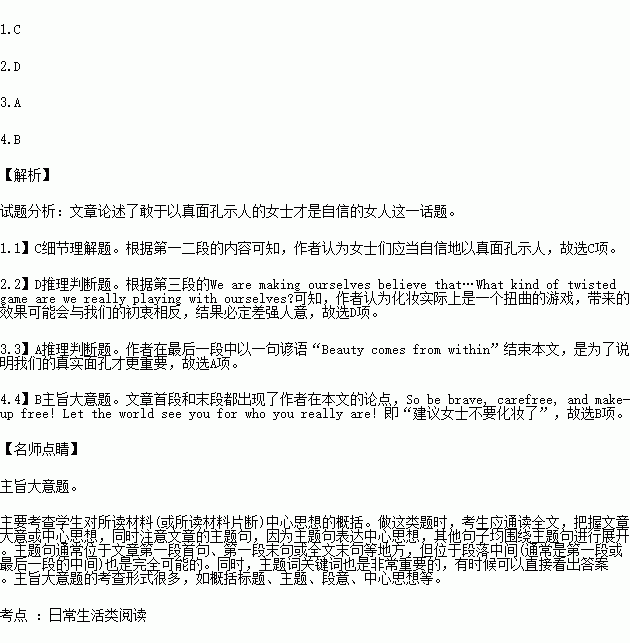题目内容
Hey, ladies! It’s summer again and it’s time for a new you! No more make-up, no more pretending! Yes, that’s right! It’s time to stop making ourselves beautiful for the camera, and start posting confident pictures without all the make-up and extra tricks we add onto ourselves in the hope of appearing more attractive and beautiful. Because believe it or not, we already are!
After we wash our face and go to bed, it is not so perfect. You know it’s the face we should confidently be showing to the world! Who cares if you have pimples(面痕)or your eyes look small, or if you have crow’s feet? Guess what? Those are actually what make you such a beautifully grown woman. And any person who doesn’t think so is just not as strong as you.
Nowadays we are so prone to do anything and everything to make us look as young and perfect as possible. Yet the truth is, by doing this, we are actually making our tree skin get worse and badly affected by all the junk we put on. We are making ourselves believe that by changing our appearance we will be more accepted and seem more attractive to other people. And yet, our final goal is to find that without all of the make-up. What kind of twisted(扭曲的)game are we really playing with ourselves?
So I would like to make a suggestion for all women out there to give yourself a break at least this summer. Take a couple of pictures without all of that make-up on. You don’t need it every single day, especially not this hot summer! You’ll be surprised that the more confident you are about showing the real side of you, the more attractive you will be to everyone else.
Yes, the saying, “Beauty comes from within” is an old one, definitely still holds some troth today. So be brave, carefree, and make-up free! Let the world see you for who you really are!
1.The author thinks that ladies should show others _______.
A. their crow’s feet
B. their beautiful pictures
C. their real face with confidence
D. their attractive appearance
2.What does the author think of adding make-up to our face?
A. It makes perfect images.
B. It makes us more accepted and attractive.
C. It makes true images go outdated.
D. It’s hard to achieve what we wish.
3.What is the author’s purpose of quoting the old saying?
A. To declare it’s what one really is that matters.
B. To show the importance of adding make-up
C. To give us some examples of adding make-up.
D. To tell us not to neglect those old sayings.
4.What is the topic of this text?
A. Spending more time being with families and friends.
B. Not putting on any make-up on our face this summer.
C. Paying enough attention to ourselves in this summer.
D. Showing the beautiful side of ourselves to others.
 阅读快车系列答案
阅读快车系列答案
